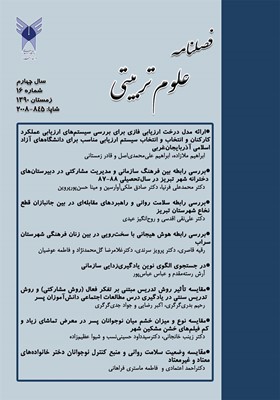A Study of Relationship between Organization Culture and Participative Management in Girls High-School in Tabriz in 1387-88
Subject Areas : Educational PsychologyMohammad Ali Farnia 1 , Mina HassanPour Parvin 2
1 - استادیار و عضو هیئت علمی دانشگاه آزاد اسلامی واحد تبریز، تبریز، ایران.
2 - کارشناس ارشد مدیریت آموزشی.
Keywords: integration, Management, Organizational Culture, involvement, mission, participative, consistency,
Abstract :
The main objective of the study is to investigate the relationship between the organizational culture and participative management in girls high-school in Tabriz.1387-88.To obtain the objective the study deals with and tests eight hypothesis. The method of the study was descriptive-correlation. The statistical population included 78 managers and 1599 teachers in girls high-school in fifth district of Tabriz .using cochrans adjusted formula the sample size was 65 managers and 325 teachers. In order to collect the data two questionnaires, namely one standard (the Denison model)and a researcher made questionnaire were used. Both descriptive and inferential statistics were used. For data analysis Pearson s correlation and SPSS software was used. The results showed that there was significant relationship between involvement, integration, consistency and mission with participative management from managers and teachers view.
احمدی،م. (1384) . رابطه فرهنگ سازمانی و استراتژی در سازمانهای رسانه ای.فصلنامه پژوهشهای ارتباطی، شماره44،ص68.
اردلان،م.ر.( 1387). بررسی رابطه بین فرهنگ سازمانی با یگانگی فرد-سازمان دردانشگاههای دولتی غرب کشور (همدان،کرمانشاه و کردستان). پایان نامه کارشناسی ارشد، دانشگاه اصفهان.
ایران زاده، س.(1381). مدیریت تطبیقی در چهار چوب پارادایمهای جدید. تبریز: مرکزآموزش مدیریت دولتی، چاپ اول.
شیخلوی اقدم،ر. (1383). بررسی رابطه شکلگیری فرهنگ مشارکتی و برنامهریزی استراتژیک در شهرداری منطقه 17 تهران. پایان نامه کارشناسی ارشد،دانشگاه تهران.
علوی،ر.(1384). مقدمهای بر رهبری نیروی انسانی، با تأکید بر مدیریت مشارکتی. فصلنامه رشد فناوری، شماره4، ص53-52.
غلامرضائی،س. رضایی،ر.ا.(1387). مدیریت مشارکتی.ماهنامه سنبله ،شماره179 ،ص63.
فردسی،ل. اورنستین،آ.(1382).مدیریت آموزشی،مفاهیم و عمل.ترجمه محمد علی فرنیا. تبریز: نشرمترجم.
فقهی فرهمند،ن .(1381).مدیریت پویای سازمان.تبریز: انتشارات فروزش،چاپ اول.
قربانی، م.ح. و همکاران (1386). مطالعه فرهنگ سازمانی سازمان تربیت بدنی جمهوری اسلامی ایران براساس مدل دنیسون و مقایسه آن با میانگینهای جهانی ششمین همایش بین المللی تربیت بدنی و علوم ورزشی.
مقیمی ، م.( 1385). سازمان و مدیریت: رویکردی پژوهشی.تهران: انتشارات ترمه،چاپ چهارم.
منوریان، ع. بختائی،ا.(1384). شناخت فرهنگ سازمانی بر اساس مدل دنیسون.مجموعه مقالات چهارمین کنفرانس بین المللی مدیریت.
منوریان،ع. قربانی،م.ح. شریفی،م.(1387). فرهنگ سازمانی با تکیه بر مدل دنیسون. شیراز: انتشارات دانشگاه شیراز، چاپ اول.
Bititci, U., Mendibil, K., Nudurupati, S., Turner, T. & arengo, P.(2004),The Interplay between Performance Measurement ,Organizational CultureAnd Management Styles, Measuring Business Excellence. Journal, Vol. 8, pp. 28-41.
Coffey, V.(2003),The Organization Culture and effectiveness ofCompanies Involved in Public Sector Housing Constriction in Hong Kong, CIBTG 23 International Conference, Hong Kong.
Denison, D., Janovics, J., Young, J. & Cho, H. J. (2007), Diagnosing Organizational Culture: Validating a model and method, working paper International Institute for Management Development, Lasanne, Switzerland.
Denton, D. K. (2000), Ingraining employee involvement into corporate decision making, second edition forum.
Fey, C. & Denison, D.(2003), Organizational Culture and Effectiveness: Can American Theory Be Applied in Russis?, Organization Science,pp.686-706.
Gillespie, M. A., Denison, D., Haaland, S., Smerek, R. & Neale, S. W. (2007), Organizational Culture and Custumer Satisfaction, Denison Consulting, Ann Arbor, MI 48104.
Hannagan, T. (2002), Mastering Strategic Management, Palgarave, pp.145-163.
Jacobus, C. (2005), Reliability of the Denison Organization Culture Survey for Use in a Financial Institution in South Africa, Submitted in Part Fulfillment of the Requirements for the Degree of Master of Commerce, University of South Africa.
Mobley, W. H., Wang, L. & Fang, K.(2005), Organizational Culture: Measuring and Developing It in Your Organization, Published in the Harvard Business Review China,pp.128-139.
Olmsted, A. & Harding, N.(2003), The Social Construction of Management, Rout ledge. UK.
Schein, E. H.(2004), Organization Culture and Leadership, 3rd ed. San Francisco, USA: Jossey Bass, pp.168-177.
Schraeder, M., Walter, T., Tears, R.& Mark, J.(2005), Organizational Culture in Public Sector Organizations, Leadership & Organization Development Journal, Vol.26, No.6.
Schulz, J. W.(2001), Tapphng the best that is within: why Corporate Culture Matters, Management Quarterly, Vol.42,pp.29-35.
Sharm, B.(2005),Local Goverment Organization on its Journey to becoming a Learning Organization, Business Process Management Journal, Volume 11, Number 4,pp. 388- 402.
Steven, D. (2005), Organizational Culture in the fire service, Fire Engineering, Vol.158, No.11-12.


